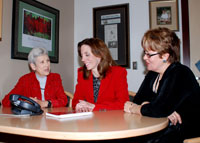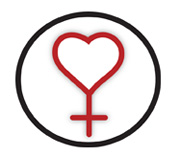More than one in three. If you're a woman, those are your chances of dying from heart disease or stroke. Your odds of dying from breast cancer are one in 27.
Cardiovascular diseases affect more women than men and heart attacks are generally more severe in women than in men. Failing to recognize and respond to symptoms of a heart attack may be part of the reason women experience a greater proportion of sudden cardiac deaths than men. That's mostly due to misperceptions on the part of women and their doctors. No wonder. The current warning signs of a heart attack are based primarily on studies of white, middle-aged men. While these are important to know, adhering too rigidly to this list may lead to inaccurate diagnoses and delay in treatment for women.
|
Traditional Heart Attack Warning Signs
(based on men's experience)
- pressure, fullness, tightness or pain in your chest lasting five minutes or longer
- constant indigestion-like discomfort
- chest pain that moves to your shoulders, arms, neck, jaw or back
- lightheadedness, dizziness, fainting, sweating or a sick stomach
- unexplained shortness of breath
- unexplained anxiety, weakness or tiredness
- palpitations, a cold sweat or paleness
|
"More and more we're finding that men and women experience heart disease very differently," says Roberta Bogaev, MD, a cardiologist and medical director of Heart Failure and Transplantation at the Texas Heart Institute and St. Luke's Episcopal Hospital.
"Physicians need to take women's health complaints seriously and understand that not all the guidelines apply to women, whose heart symptoms may appear more non-specific," she says. "It's important for women to have a good working relationship with their doctor and be aware of their own risk factors for heart disease."
A recent study sheds new light on just how differently women experience heart attack than do men. A survey of more than 500 women found that 95 percent had specifically new and different symptoms up to a month before their heart attacks. Fatigue and sleeping problems top the list. More than 70 percent of the patients experienced no chest discomfort, and most men do.
|
Most Common Symptoms Reported by Women
in the Month Before Heart Attack:
- 71% unexplained or unusual fatigue
- 48% sleep disturbance
- 42% shortness of breath
- 39% indigestion
- 35% anxiety
|
"Women could easily wave off their symptoms as being signs of stress or aging or simply having a very busy lifestyle. This study should serve as a red flag for women to pay attention to their bodies and look for trends, particularly women with known risk factors," says Dr. Bogaev.
Risk factors among study participants were significant in that 96 percent had a family history of heart disease, 62 percent had a personal history of heart disease and 33 percent had diabetes.
"What women really need to notice are sudden changes in symptoms that are persistent over the course of a month. The women in this study described their fatigue and sleeplessness as severe; for example, being unable to make the bed without resting," explains Dr. Bogaev.
How women respond to their symptoms could mean the difference between life and death. In the study, some of the women ignored their symptoms whereas others repeatedly sought medical care only to have their doctors minimize, misdiagnose or ignore their symptoms.

Good Housekeeping magazine has listed the Texas Heart Institute at CHI St. Luke’s Health - Baylor St. Luke’s Medical Center as one of the leading cardiac centers for women. |
The symptoms women described at the time of their heart attacks were also interesting. Nearly 58 percent had shortness of breath, 55 percent experienced weakness, 43 percent felt fatigue, 39 percent had dizziness. Notably, 43 percent of them experienced no chest pain. Of those that did, they described the discomfort as pressure, aching or tightness – not pain – and it mostly occurred in the back and high chest.
"The lesson here is to be aware of all the warning signs. Anyone who has any of these signs for five minutes or longer should see a doctor right away. And patients should be assertive in their care," says Dr. Bogaev. "The bottom line is if there is a sudden change in symptoms and you're just not feeling right, go to the doctor."
 The Make the Call. Don't Miss a Beat. campaign is a national public education campaign that aims to educate, engage, and empower women and their families to learn the seven most common symptoms of a heart attack and encourage them to call 9-1-1 as soon as those symptoms arise. Go to www.womenshealth.gov/heartattack/.
The Make the Call. Don't Miss a Beat. campaign is a national public education campaign that aims to educate, engage, and empower women and their families to learn the seven most common symptoms of a heart attack and encourage them to call 9-1-1 as soon as those symptoms arise. Go to www.womenshealth.gov/heartattack/.
Learn more about these topics in the Texas Heart Institute Heart Information Center.
♥ Heart Failure
♥ Heart Attack
Updated July 2011



